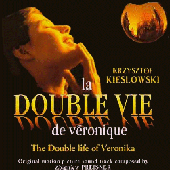The
Double Life of Véronique
Music composed by ZBIGNIEW PREISNER
- Performed by the SILESIA PHILHARMONIC CHOIR; GREAT ORCHESTRA OF KATOWICE/ANTONI
WIT
Discovery DP1001 - 1991 Duration
31:08 |
La
Double vie de Véronique is a strange tale. Two women born on the
same day, several thousand miles apart, one in Warsaw and the other one
in Paris seemed somehow linked without knowing it. French actress Irène
Jacob plays the two characters who in fact are like twins.
The film opens in Poland with a beautiful
sequence with some choral music when we follow the steps of Weronika.
Through a chance encounter she is been given, because of her beautiful
unusual high pitched voice a role for a performance of a "nearly unknown
composer who happened to live in Holland at the end of the XVIIIth century",
so we are told.
We hear this strange and beautiful
music first during a rehearsal and I have to admit to have been wondering
who was this long rgotten composer I did not know ! In
fact all the music has been written by Zbigniew Preisner. Kieslowski and
Preisner went to great lengths to prop up this joke made at the expense
of classical buffs enthralled by this new obsession for superfluous
information. (All this in typical Kieslowski's ironic style). In
fact all the music has been written by Zbigniew Preisner. Kieslowski and
Preisner went to great lengths to prop up this joke made at the expense
of classical buffs enthralled by this new obsession for superfluous
information. (All this in typical Kieslowski's ironic style).
Thus on the CD track list, we are
told one cue was taken from the 1798 version of the Concerto in E minor
(with even an opus number!), then an other one is an excerpt from the 1802
version !
When comes the evening of the premiere,
at the height of the climax, while the melody is in full flight, all of
the sudden Weronika's voice starts to wobble and breaks. She collapses
and dies on the spot of a broken heart.
This scene is very moving but at
the same time there is a dark irony to it.
And let's face it : the swan song
of a diva dying on stage, heart broken, is certainly one of the worse cliché
inherited from the XIXth century opera tradition.. But because of Kieslowski's
talent as a story teller, Preisner's music and Irène Jacob
beautiful performance the whole episode works fine. Kieslowski, as a puppet
master playing God, enjoys himself tremendously when he creates highly
improbable coincidences, then he leads the audience to believe these mysterious
events will be explained. But nothing happens: there is no explanation,
no purpose. Life still remains a riddle, absurd, cruel, but also could
be beautiful even if there is no much point in trying to make sense of
it.
In the second part of the film, we
see the other Véronique in Paris. First she gives up her singing
lessons without explanation. Obviously the audience knows why - because
this happens after the sudden death of Weronika. But then Véronique
(she is a music teacher) decides to have her pupils playing a Concerto
in E minor from an unknown Dutch composer ! Thus the music works as a link
between the two Véroniques. One sings the concerto and the other
conducts a performance.
Preisner 's music is very different
from mainstream Hollywood. No huge symphonic orchestra, no masses of strings
but instead he uses a lot woodwinds, especially the Pan flutes and also
choirs. He is very good at weaving delicate textures with, for example,
harpsichord, or delayed pianos for very atmospheric pieces (the Puppet
Master). His style is very much anchored in the mid European and Polish
tradition, folk like melodies, modes, also tone clusters accompanying religious
choral singing, and in fact his sound world is not so far removed from
Gorecki's - with a lot more humour obviously.
His music wonderfully blends in
with Kieslowki's beautifully shot pictures in this slightly faded golden
light and helps to create this enigmatic and nostalgic atmosphere |